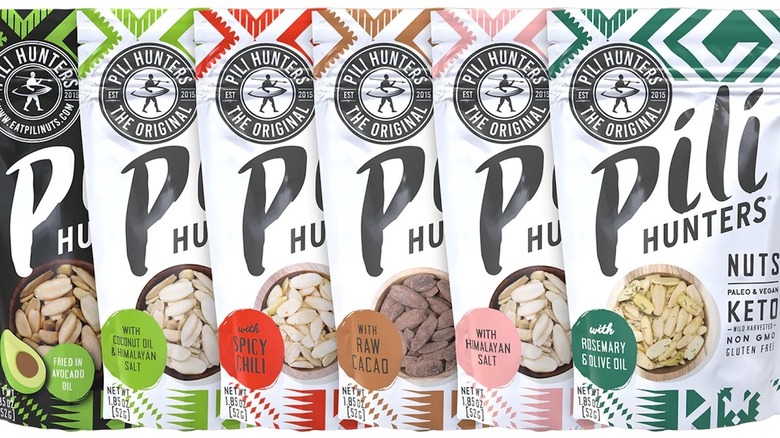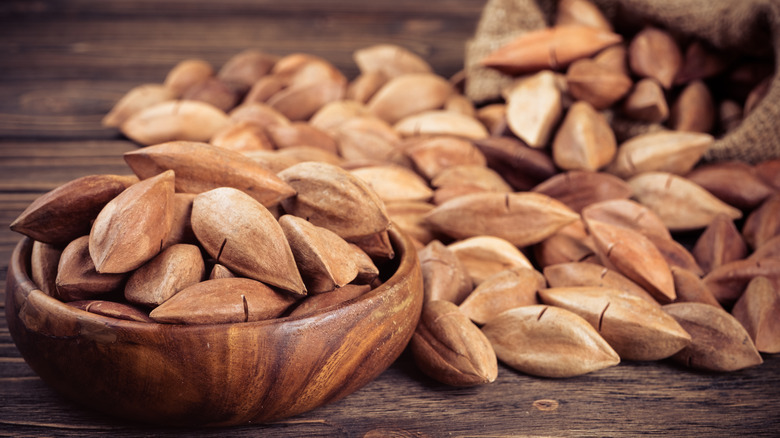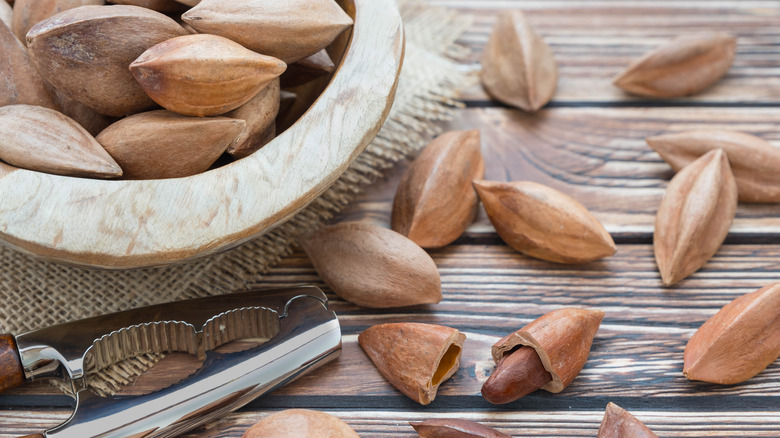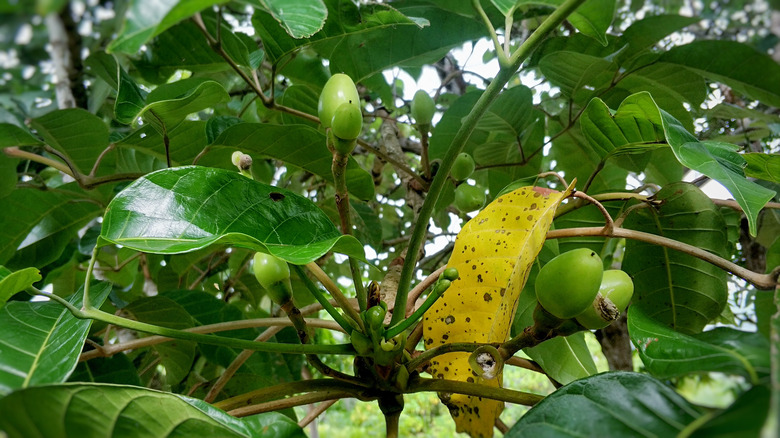Pili Hunters: Here's What Happened After Shark Tank
You might think that someone can only get so excited about a bag of nuts. If that's true, then you've never encountered Pili Hunters' founder Jason Thomas. The entrepreneur, who had previously worked in such varied careers as arctic construction, kitesurfing instruction, and mountaineering, appeared on "Shark Tank" in the 6th episode of the 11th season, looking for $325,000 for his exciting and unusual nut company.
Thomas had come on the show to promote his attempt to bring pili nuts from the Philippines to the U.S., marketing them as sustainable and "better than organic," because they are harvested in the wild from existing trees. The nuts are packed with nutrients like potassium, zinc, calcium, and copper, and they are naturally gluten-free, vegan, keto-friendly, and paleo. He had stumbled across the nut during his global travels and fell in love with the seed, and he decided to market the pili nut himself with only an old truck to help him spread the word.
What happened to Pili Hunters on Shark Tank?
Jason Thomas approached the sharks with a story about how a trip to the Philippines put him in contact with an incredible, but relatively unknown, nut. Pili nuts, he explained, were an extremely healthy protein option that grew in abundance in the Philippines, but they couldn't be found anywhere in America. He took home ten pounds of pili nuts from that trip and decided to start a company that would sell them in different flavors, use them in nut butter, and incorporate them into other snacks, like chocolate bars. Thomas wanted $325,000 in exchange for 10% equity in the company, but though his samples were a hit with the panel, he walked away empty-handed.
Daniel Lubetzky and Mark Cuban, who appeared on the episode as guest sharks, cited supply chain concerns as their reason for dropping the pitch. Kevin O'Leary and Lori Greiner liked the nuts but didn't like the business prospects — or Thomas' failure to bring order forms to a trade show where the nuts were showcased. But the main issue was brought up by Robert Herjavec, who thought Thomas was getting ahead of himself by focusing on too many different pili nut products.
Pili Hunters after Shark Tank
Though there were no bites from the sharks, and Thomas left the show without a deal or additional funding, the entrepreneur made the most of his short-term failure, doubling down and creating a company that turned out to be more successful than he could have anticipated.
Thomas ignored the feedback that he needed to focus his efforts on one product and continued to play with different formats and product variations. He expanded Pili Nuts by targeting health food stores and digital sales platforms throughout the United States, focusing on the nut's image as "the world's healthiest nut," thanks to its low carb, high protein nutrition content. Pili Hunters began to lean heavily into the keto aspect of the brand, with a company blog largely dedicated to keto content and strategic partnerships with keto influencers like Thomas DeLauer and Maria Emmerich. By teaming up with paleo, keto, and other food lifestyle influencers, and aligning themselves with an outdoorsy and nutrition-focused crowd, Pili Hunters has been able to carve out a niche for itself in the snack food world.
Is Pili Hunters still in business?
Pili Hunters, which is based out of Bend, Oregon, is still in business and thriving, and founder Jason Thomas is just as involved as always. The company currently offers eight flavors of Pili Nuts, including ones like Rosemary & Olive Oil and Spicy Labuyo Chili, as well as seasonal flavors like Carny Fried Dough or Matcha & Moringa. They have also expanded to selling three different types of pili nut butters (with hazelnut, maca, cocoa, and other fun add-ins), a Fermented Labuyo Chili Hot Sauce, Raw Piliwot Honey, and two chocolate bars (one of which is keto), as well as assorted merch.
In a 2022 interview with GoSolo, Thomas acknowledged the difficulties he faced entering this market niche: "The food industry can be tough. Tight margins and no protection from knockoffs." But he remained grateful for the "thousands of jobs" he managed to create through Pili Hunters.
What's next for Pili Hunters?
Pili Hunters is currently valued at $5.6 million, up from the $3.25 million it was valued at before Thomas's appearance on "Shark Tank." He is still the owner and CEO, and more than that, he's a poster child for the brand through his history as a world traveler and intense adventurer fueled by pili nuts.
Pili Hunters currently pulls in an estimated $4 million in revenue each year and has been able to thrive due to the personal relationships Thomas has developed with the Filipino farmers he sources his pili nuts from. He also works closely with the stores that sell Pili Hunters products, and he has also expanded to selling through Amazon, as well as on the Pili Hunters website, which even has a unique subscription service for loyal customers.
Pili Hunters has remained small and independent and even turned down a deal with an unnamed "local superfoods company" over sustainability concerns (per Eat Pili Nuts). It makes you wonder if they would have been able to stick to their vision for the company if things had gone a little differently on "Shark Tank."





